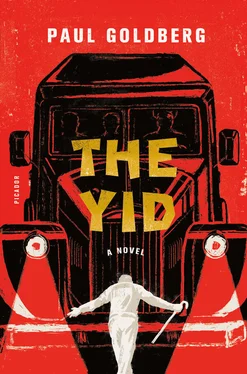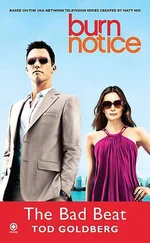“This is Comrade Solomon Mikhoels and his assistant, Tatyana Goldshtein,” Bunyan said in English. “They are from the Jewish theater in Moscow, here making preparations for filming.”
Mikhoels sat beneath a large portrait of Iosif Vissarionovich Stalin. It was an oil, in a heavy gold-leaf frame, a big portrait probably done by a big artist. In accordance with long-standing tradition, the portraits of Soviet leaders weren’t hung flat against the wall, but were angled slightly, to create the impression that the leader is looking down at the viewer.
Lewis nodded politely. What did any of this have to do with him?
The man looked like a Party worker, a new aristocrat traveling with his mistress. He wore a blue European suit and black leather shoes that were so small and delicate that they surely precluded any attempt at mobility in the frost and mud of Magnitogorsk.
* * *
“Kak vam nravyatsya nashi zhenshchiny?” Mikhoels asked, looking over the unusually pigmented builder of Socialism. How do you like our women?
This was not an effective icebreaker.
“Our women…” Lewis knew that even people who swore to have negated race could not be trusted on the subject of what was once known as corruption of blood. Did he catch Lewis staring at that girl’s charcoal eyes, her thick braid, her small upturned breasts?
Did this man, who surely lived in a heated apartment, understand what it was like to live in the Magnitogorsk workers’ barracks, where every square centimeter was shared with others, and where fucking was, in effect, a spectator sport?
Did he want to know about peasant girls who raised their skirts — actually, untied the drawstrings of their trousers — without waiting to be asked? Or did he want to know how Lewis’s adolescence shaped his attitude toward white women? If so, he would want to hear that after the murderous Omaha race riots of 1919, Lewis’s mother took to smacking him upside the head every time he looked at a white girl. Would this Comrade Mikhoels care to know that punitive measures intensify one’s interest in the forbidden?
Cringing, Bunyan translated Mikhoels’s artless question. He knew that Lewis’s Russian was good and getting better, and he sensed correctly that with or without a translation, the question would remain unanswered.
The intense stare of Mikhoels’s dark eyes glaring beneath a soaring forehead added to Lewis’s discomfort.
After a long, tense pause, Mikhoels posed another question: “Vy Kommunist?” Another icebreaker.
“Tell him I have no part-bilet ,” Lewis replied in a mixture of Russian and English.
Indeed, Lewis was not a card-carrying Communist, and the reasons for his decision not to join the Party were inseparable from his reasons for declining to discuss “our” women.
“How can I help you?” Lewis asked in English.
“We’d like you to consider appearing in a film,” said Mikhoels in Russian.
“That’s not what I do,” Lewis answered in English.
This wasn’t a conversation. These were chunks of ice slamming into each other randomly, with great force.
“Vy budete igrat’ vashego soplemennika,” Mikhoels continued. You will be playing one of your tribesmen. That was an odd choice of words: tribesmen. What did he think Lewis was? A Zulu?
Surely Mikhoels understood that the audience had gone home, yet, speaking slowly, enunciating, he proceeded to lay out his film’s storyline: a Jewish Communist, a bricklayer, returns to his native shtetl after twenty-eight years of laying brick in America. He is accompanied by his wife and a Negro comrade …
“Why?” Lewis interrupted in Russian. “Why not just have him travel with his wife and no Negro comrade?”
“Your Russian is very good,” noted Mikhoels with a faint smile.
“And that surprises you…”
“It does, I confess.”
The smile was still there, infuriating, frozen. What was its cause? Did this man think he had solved some quintessential mystery? Was he pondering something Lewis didn’t want him to ponder? Lewis wanted out of that room, out of that idiotic conversation, away from that clueless film that shouldn’t be made.
“Then maybe you’ll answer my question: Why not leave that Negro at home?”
Mikhoels turned to the young woman: “Tanechka, please go down to the cafeteria and bring me a glass of tea.”
The young woman got up with hesitation and slowly headed for the door. Lewis refrained from watching her leave. This was what they wanted, of course, to catch him casting a glance at her buttocks.
“Let me guess, your Negro comrade is incidental to the story,” said Lewis as the door closed.
“He is…”
“And your main characters are Jews, all of them, no doubt, exquisitely portrayed?”
Mikhoels nodded. “It’s a good script.”
“And the Negro has bulging eyes, a radiant smile, broad shoulders, massive ivory teeth, bubbly enthusiasm.”
Another nod.
“Zachem vam eto?” asked Lewis in Russian. Why do you need this?
“To make the whole thing passable, Comrade Lewis, to tell a deeper story. Comintern wants the Negro angle. The Negro Question is America’s Achilles’ heel, as they say. Personally, I don’t know whether it is or isn’t. Is it?”
“It can be,” said Lewis. He smiled, realizing that surely Mikhoels would be pleased to see that the Negro before him had big, white, healthy teeth.
“Like you, I am not a Communist,” said Mikhoels. “You are a simple welder, and I am a simple storyteller. And without you, I can’t tell my story.”
“Po ulitsam slona vodili/Kak vidno napokaz…” said Lewis, quoting a fable he had learned soon after arriving in Russia. An elephant was led through the streets, evidently for display …
With considerable satisfaction, Lewis noted that Mikhoels started to look tense, uncomfortable. His point seemed to be getting across.
“You need an elephant, Comrade Mikhoels, and I am not an elephant. I am a welder.”
“The question of nationalities is complicated and fraught with inconsistency, Mr. Lewis.”
“The Party’s policy toward American Negroes should be guided by the same principles of internationalism as its policy toward Soviet Jews.”
“That would be correct…”
“So why do you need a character who is so devoid of substance that even a clowning welder can portray him? You know what this character would be called where I come from? Repeat after me: ‘a happy nigger.’”
“A happy nigger.” Mikhoels mouthed the English words he had obviously not heard in the past. “Sounds Fascist,” he added in Russian.
“Let me guess: his name is Jim. Nigger Jim, or Comrade Jim. Find yourself someone else, Comrade Mikhoels.”
“There is no one else here.”
“And in Moscow?”
“In Moscow, they are busy.”
“I am not jolly enough for you.”
“You are obviously a person of substance. Is there anything at all I can do to convince you?”
Was he offering money? A heated room? A door? A transfer to Moscow? Admission to an engineering institute? A trip to Crimea? A complimentary season pass to his theater? His girlfriend’s ass?
The girl returned just in time to hear Lewis’s reply:
“Take my advice, Comrade Mikhoels. You go get yourself a bug-eyed, toothy Jew and paint him black.”
Where is it written that a man is entitled to a history?
Levinson has little more than a few shards of facts about his parents, but he has one feeling, the feeling of joy he felt when his father, Shimon Levinson, came to see him to play their game. Even years later, he can hear the bursts of his own laughter.
Читать дальше












